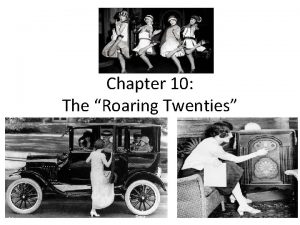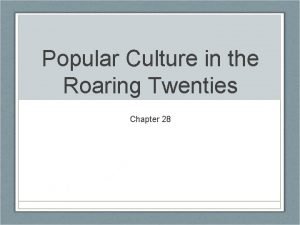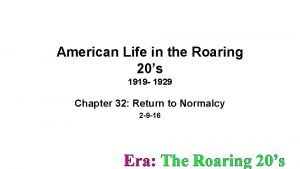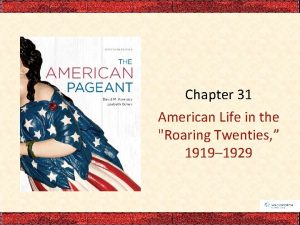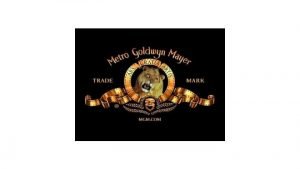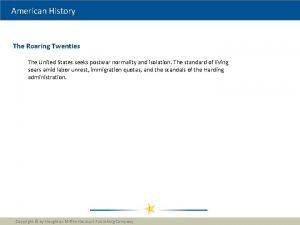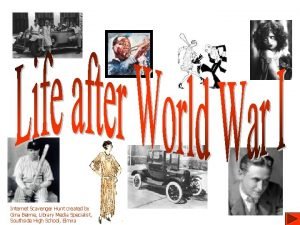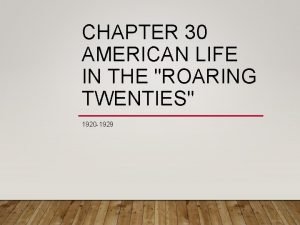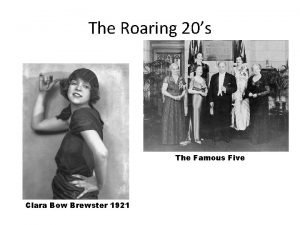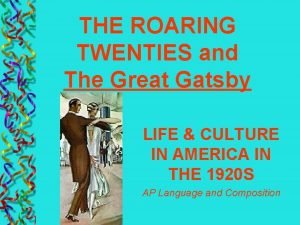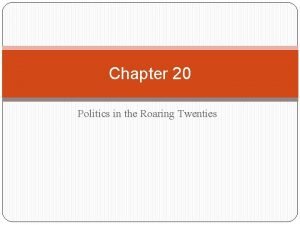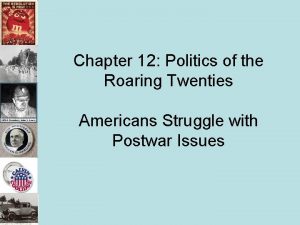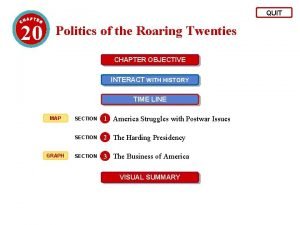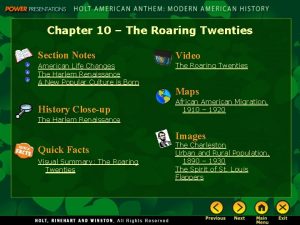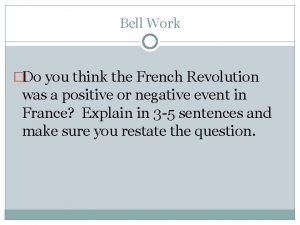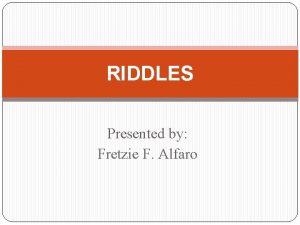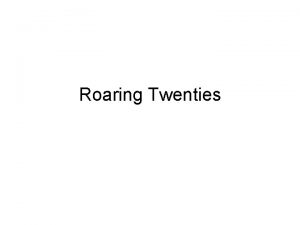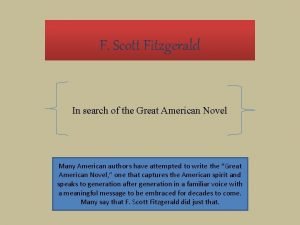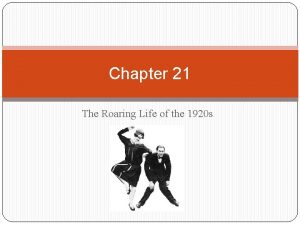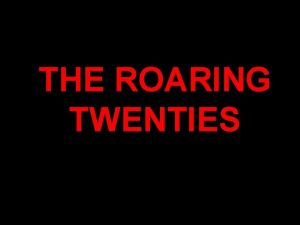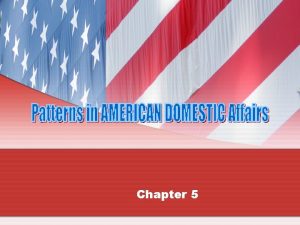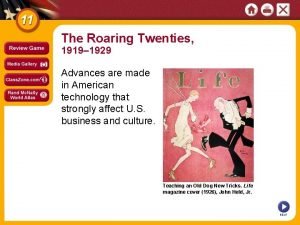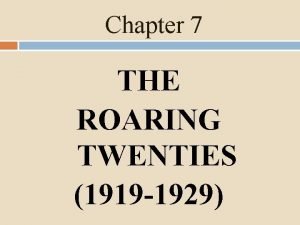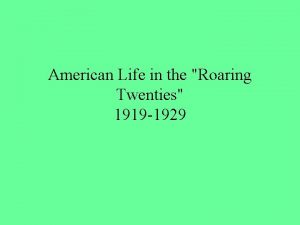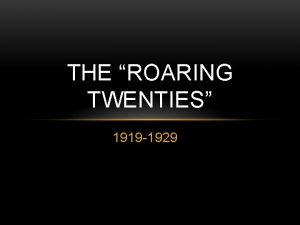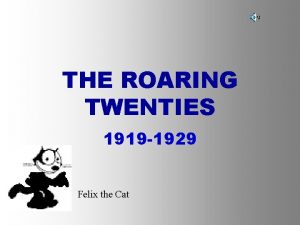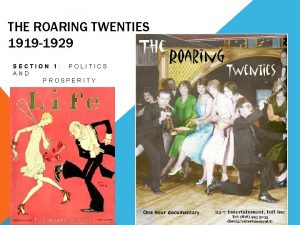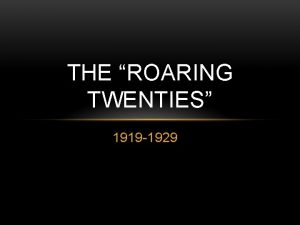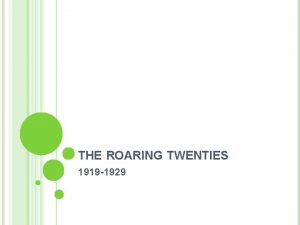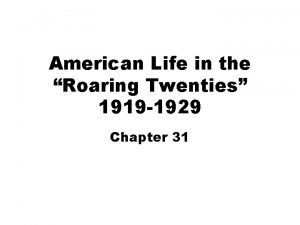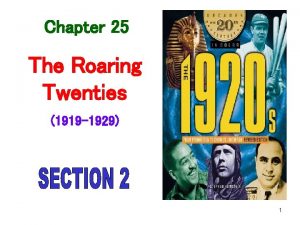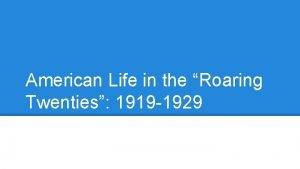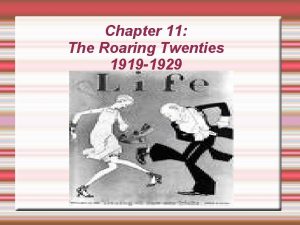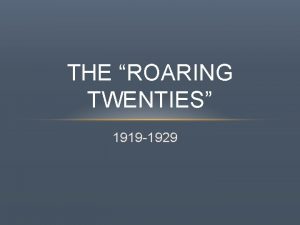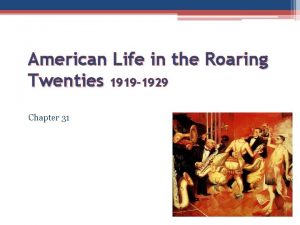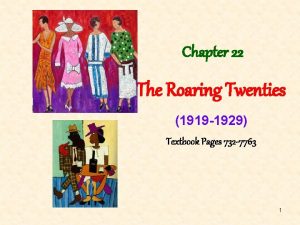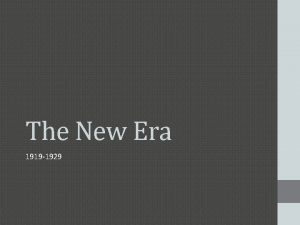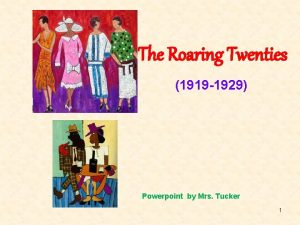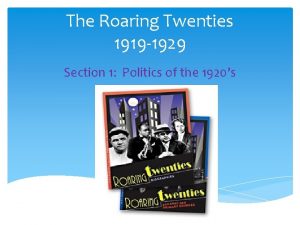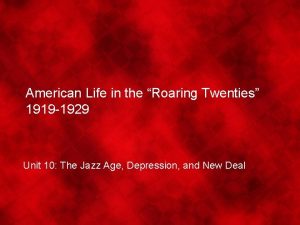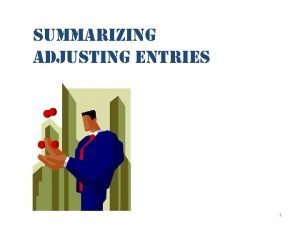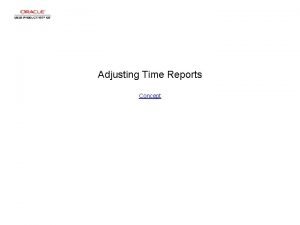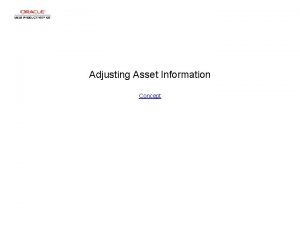The Roaring Twenties 1919 1929 Adjusting to Peacetime



























- Slides: 27

The Roaring Twenties 1919 -1929

Adjusting to Peacetime n Adjusting to peacetime – The Treaty of Versailles was not approved by the United States Senate. – The US did NOT become part of the League of Nations. – When President Woodrow Wilson returned from Paris, he was very unpopular. n The economy was not doing well. n Americans feared communism.

Adjusting to Peacetime – In 1920, Warren Harding was elected President. His slogan was “Return to Normalcy” n Warren G. Harding n He supported business, lowered taxes on business and the wealthy Some of Harding’s appointees were personal friends, because of this, his presidency had many scandals. – Charles Forbes, the head of the Veterans Bureau took $200 Million worth of bribes.

Adjusting to Peacetime Albert B. Fall Calvin Coolidge – The Teapot Dome Scandal-The Secretary of the Department of the Interior Albert B. Fall leased land its reserves to an oil company. He received a bribe. He was tried and convicted and the first Cabinet member to ever go to prison. – In 1923, Harding died of a heart attack, and his Vice President, Calvin Coolidge became president. – Coolidge cooperated with investigations into Harding’s scandals; he ran again in 1924 and was re-elected.

Adjusting to Peacetime – Most Americans did not want to play a role in Foreign affairs, they wanted isolation n n The US worked in International conferences to promote world peace and encourage disarmament. The Kellogg-Briand Pact was signed that condemned military aggression and outlawed war, but had no punishment for either.

Adjusting to Peacetime n Coolidge believed that government had the right to intervene in other countries affairs. – Sent troops to Nicaragua to “Protect American Business Interests” – The US tried to weaken the soviet Communist government and refused to grant it diplomatic recognition.

Adjusting to Peacetime – The Red Scare was the fear of Communism and Anarchists. n n Many anarchists were foreign born, and there were many bombings by these anarchists. This led to thousands of anarchists and Communists being hunted down or arrested. Many were deported

Adjusting to Peacetime n Sacco and Vanzetti were two Italian immigrants. They were charged with robbing and murdering two people in Massachusetts. – There was little evidence, but the prosecutors focused on the fact that the defendants were foreigners and anarchists. – They were convicted and executed in 1927.

Adjusting to Peacetime – Fear of radicals led to limits in immigration n Emergency immigration laws were passed in 1921 – Limited the number of people admitted from Eastern and Southern Europe – In 1924 -1929, there were more restrictions – The US completely prohibited immigration from Asia. – These laws did not apply to people from the Americas.

Changes in American –Society During WWI, support for prohibition grew. n n n By 1919, Congress passed the Eighteenth Amendment. This prohibited the making, selling or transporting alcohol This law was impossible to enforce. People smuggled liquor from Canada and the Caribbean, called Bootleggers People had illegal taverns called speakeasies. With the money made from bootlegging, organized crime increased.

Changes in American Society – Women got the right to vote with the Nineteenth Amendment and voted for president for the first time in 1920. n Women were elected as governors in 1924 – More women were now holding jobs. n Women became flappers – They rebelled against tradition – Wore bright make-up, short skirts and short bobbed haircuts

– Changes in American Society Henry Ford helped to put middle class families in cars with the assembly line n n It became a symbol of freedom and independence Families moved out of the city and into the suburbs Radio became a supplier of entertainment First station in 1920, by 1926 there were 700+ stations

Changes in American Society Films n – At first films were silent – 1920 was the first “Talkie” film—“The Jazz Singer” – There were actions, comedies and animated movies. – Walt Disney company was founded in 1923 – This was the Rise of the Celebrity

– Changes in American Society The Scopes Trial (1925) n A biology teacher John Scopes, from Tennessee was accused of breaking the law by teaching evolution – Charles Darwin’s theory that life evolved, unlike the bible n n The trial was modern, urban Americans VS. Traditional, rural Americans. Scopes was convicted and lost his job

Changes in American Society – African Americans thought that they may get racial equality after WWI. n n n Many African Americans moved north, they crowded into places that they were allowed to move. There were racial tensions and riots Marcus Garvey created the United Negro Improvement Association to promote Black pride and unity – Encouraged African Americans to move back to Africa

Changes in American Society n The KKK, Ku Klux Klan hated blacks, immigrants, Catholics and Jews – It spread to the South, Mid west and West – Public scandals and a good economy caused the KKK to loose support.

The Jazz Age – There were many new fads n n Dance fads like the Charleston Flagpole Sitting Dance marathons that lasted hundreds of hours Mah-Jongg

– The Jazz Age New Heroes n Sports became much more important – – – n Babe Ruth (Baseball) Johnny Weissmuller (Swimming) Red Grange (Football) Bobby Jones (Golf) Jack Dempsey (Boxing) Mass media helped to make these people celebrities

The Jazz Age n Charles Lindbergh, Lucky Lindy, was the first pilot to fly nonstop across the Atlantic – He became an instant hero

The Jazz Age – Jazz became the new music sensation n n n It was created in New Orleans Jazz spread quickly to other major cities Louis Armstrong, Bessie Smith and Duke Ellington Radio helped to spread Jazz was so popular that the 1920 s became known as the Jazz Age Older people did not like the music and thought that it under minded morals

The Jazz Age – Literature became important n n Writers described the era, both the good and the bad. Many American writers disliked society so they left the country. – – – F. Scott Fitzgerald wrote the Great Gatsby about the corrupt society of the wealthy Ernest Hemminway wrote The Sun Also Rises and A Farewell to Arms about the war Sinclair Lewis wrote Babbitt criticizing American Society

The Jazz Age – The Harlem Renaissance n n Writers, musicians and poets reacted against prejudice while expressing hope Poet Langston Hughes wrote beautiful poems, many had racial pride Dream Deferred What happens to a dream deferred? Does it dry up Like a raisin in the sun? Or fester like a sore-And then run? Does it stink like rotten meat? Or crust and sugar over-like a syrupy sweet? Dream Variations To fling my arms wide In some place of the sun, To whirl and to dance Maybe it just sags Till the white day is done. like a heavy load. Then rest at cool evening Or does it explode? Beneath a tall tree While night comes on gently, Dark like me. That is my dream! To fling my arms wide In the face of the sun, Dance! Whirl! Till the quick day is done. Rest at pale evening. . . A tall, slim tree. . . Night coming tenderly Black like me.

The Economy of the 1920’s – Directly after WWI, agriculture and Industry did not do well. n n This changed for industry when they switched from producing military goods to consumer goods As goods came, prices dropped – Increase supply, Decrease Demand

The Economy of the 1920’s n n Businesses offered installment buying, or buying on credit. (Payment Plan) There were many new electric appliances – Government kept taxes high on imports, taxes on the wealthy were cut.

– The Economy of the 1920’s Many people began to buy stocks or shares of companies n n n Because people kept buying, there was a time when the stock market value kept rising. It was called the bull market People began to buy on margin, or borrowed money in order to buy the stock Stock prices kept rising but economists, people who work with money, said it would not last

The Economy of the 1920’s – At the same time, many others were living in poverty. n There was an agricultural depression – American farmers grew more crops then the public could consume. – There was also debt from farmers not being able to pay for their equipment.

The Economy of the 1920’s – In the 1928 presidential election it was Republican Herbert Hoover Vs. Democrat Alfred E. Smith n Herbert Hoover was elected on the "Prosperity" campaign
 Chapter 10 the roaring twenties
Chapter 10 the roaring twenties Chapter 28 popular culture in the roaring twenties
Chapter 28 popular culture in the roaring twenties Roaring twenties acrostic poem
Roaring twenties acrostic poem Chapter 31 american life in the roaring twenties
Chapter 31 american life in the roaring twenties Roaring twenties were characterized by
Roaring twenties were characterized by The roaring twenties canada
The roaring twenties canada The roaring twenties lesson 3 changing ways of life
The roaring twenties lesson 3 changing ways of life Roaring twenties scavenger hunt answers
Roaring twenties scavenger hunt answers Chapter 30 american life in the roaring twenties
Chapter 30 american life in the roaring twenties Roaring twenties acrostic poem
Roaring twenties acrostic poem Roaring twenties great gatsby
Roaring twenties great gatsby Chapter 20 politics of the roaring twenties
Chapter 20 politics of the roaring twenties Chapter 12 politics of the roaring twenties
Chapter 12 politics of the roaring twenties Chapter 20 politics of the roaring twenties answer key
Chapter 20 politics of the roaring twenties answer key Chapter 20 politics of the roaring twenties
Chapter 20 politics of the roaring twenties Chapter 10 the roaring twenties
Chapter 10 the roaring twenties Yoshiko imamoto
Yoshiko imamoto Napoleon's peacetime accomplishments
Napoleon's peacetime accomplishments Roaring flame bunsen burner
Roaring flame bunsen burner Romeo and juliet act 4 scene 1
Romeo and juliet act 4 scene 1 Baboy sa lasang ang tunok puro lansang answer
Baboy sa lasang ang tunok puro lansang answer Simile onomatopoeia metaphor personification
Simile onomatopoeia metaphor personification Demobilization and adjustment to peace 1920
Demobilization and adjustment to peace 1920 The roaring 20’s / jazz age
The roaring 20’s / jazz age Chapter 13 the roaring life of the 1920s
Chapter 13 the roaring life of the 1920s 20s decade fashion
20s decade fashion Roaring rockets powerpoint
Roaring rockets powerpoint Roaring 20s vocabulary
Roaring 20s vocabulary
